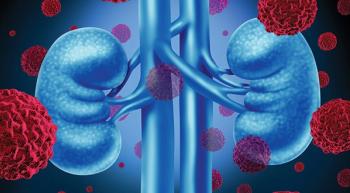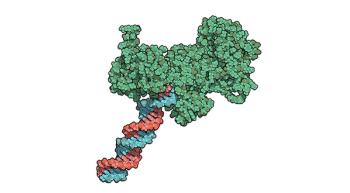
The FDA has granted an accelerated approval to pembrolizumab (Keytruda) for the treatment of patients with advanced, PD-L1–positive cervical cancer with disease progression on or after chemotherapy.

The FDA has granted an accelerated approval to pembrolizumab (Keytruda) for the treatment of patients with advanced, PD-L1–positive cervical cancer with disease progression on or after chemotherapy.

Chemotherapy-induced peripheral neuropathy (CIPN) is a potentially long-lasting adverse effect of cancer treatment for survivors of childhood cancer.

Based on results from the phase III MURANO trial, the FDA has granted a regular approval to venetoclax (Venclexta) in combination with rituximab for the treatment of patients with chronic lymphocytic leukemia (CLL) or small lymphocytic lymphoma (SLL), with or without 17p deletion, following at least 1 prior therapy.

An off-the-shelf, dual-targeted chimeric antigen receptor (CAR) T-cell approach yielded positive results in preclinical specificity, functionality, and efficacy studies.

The FDA has granted a priority review to the PARP inhibitor talazoparib for the treatment of patients with germline BRCA–positive, HER2–negative locally advanced or metastatic breast cancer.

The FDA approved sargramostim (Leukine) for the treatment of adult and pediatric with hematopoietic subsyndrome of acute radiation syndrome (H-ARS).

The FDA approved pegfilgrastim-jmdb (Fulphila) as the first biosimilar to pegfilgrastim (Neulasta), a drug designed to reduce the risk of febrile neutropenia in patients treated with chemotherapy in certain types of cancer, according to a press release issued by the FDA.

Game-changing data published in the New England Journal of Medicine and presented during the 2018 ASCO Annual Meeting indicated that many women with HR+, HER2–, axillary node–negative breast cancer would see no significant benefit to having chemotherapy in addition to endocrine therapy.

As part of its continuing effort to recognize the important role an oncology nurse plays throughout a patient’s cancer journey, Oncology Nursing News® has kicked of the #AnOncNurseIs campaign.

This summer, Oncology Nursing News is kicking off a social media campaign that gives you the chance to tell the world what #AnOncNurseIs!

The FDA has granted breakthrough therapy designation to the kinase inhibitor crizotinib (Xalkori) for two indications.

The FDA has granted a priority review to the oral thrombopoietin-receptor agonist eltrombopag (Promacta) in combination with standard immunosuppressive therapy as a frontline treatment for severe aplastic anemia.

A general lack of understanding of biosimilar drug terminology among clinicians, constantly evolving regulatory guidance, and the processes of prescribing and dispensing biosimilars is concerning, says the American Society of Clinical Oncology.

The FDA has granted a priority review to the pan-TRK inhibitor larotrectinib for the treatment of adult and pediatric patients with locally advanced or metastatic solid tumors with an NTRK gene fusion.

The FDA has granted a priority review to a new drug application for gilteritinib for the treatment of adult patients with FLT3 mutation–positive relapsed or refractory acute myeloid leukemia.

The FDA has approved a new formulation of abiraterone acetate (Yonsa) to be used in combination with methylprednisolone to treat metastatic castration-resistant prostate cancer (mCRPC).

Researchers from the National Cancer Institute (NCI) used data from its Health Information National Trends Survey to assess knowledge of, and beliefs about, cancer screening.

Oncology Nursing News® will be hosting its first tweet chat on May 23, at 1 p.m. ET, to discuss findings presented at the Oncology Nursing Society's Annual Conference, held May 17-20 in Washington, DC.

“While there is substantial research documenting the psychosocial characteristics in cancer patients and local caregivers to date, none have focused solely on the comparison of patients with their distance caregivers,” the researchers stated in an abstract presented by AnnMarie Papik, B.S.

Recommended treatment regimens for patients with renal cell carcinoma (RCC) continue to change as novel therapies and combinations are approved by the FDA.

The FDA has approved epoetin alfa-epbx (Retacrit) as a biosimilar to epoetin alfa (Epogen/Procrit) for the treatment of anemia caused by chemotherapy, chronic kidney disease, or use of zidovudine in patients with HIV infection.

Adverse effects from immunotherapy for genitourinary cancer typically require a multidisciplinary approach among health care teams.

Codman pumps, manufactured by Cerenovus, are no longer being produced as of April 1, because of manufacturing issues, however, there are other ways to deliver possibly life-extending intrahepatic treatment.

President Donald Trump's recently announced “blueprint” to lower the prices of prescription drugs in the United States drew cautious responses from oncology groups and patient advocates.

With the approval of rucaparib in April 2018, there are now 3 PARP inhibitors approved for use in the maintenance setting for patients with ovarian cancer who are in a complete or partial response to platinum-based chemotherapy, and they are significantly improving progression-free survival.

Oncologist Kelly McCann, MD, PhD, reviews the vast improvements in the treatment landscape for patients with HER2-positive breast cancer, as well as the work that lies ahead.

The National Colorectal Cancer Roundtable has created a special toolkit to help physicians successfully determine and evaluate family history to detect colorectal cancer at an earlier age.

The FDA has approved the monoclonal antibody daratumumab (Darzalex), in combination with bortezomib (Velcade), melphalan, and prednisone (VMP) for the treatment of patients with newly diagnosed multiple myeloma who are ineligible for autologous stem cell transplant.

More than two thousand nurses who self-assessed their knowledge and confidence in their abilities to identify and intervene with caregivers of patients with cancer shows significant room for improvement.

The FDA has granted a priority review to atezolizumab (Tecentriq) in combination with bevacizumab (Avastin), carboplatin, and paclitaxel for the frontline treatment of patients with metastatic nonsquamous non–small cell lung cancer (NSCLC).